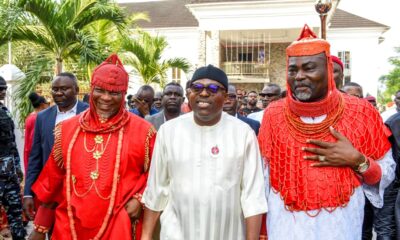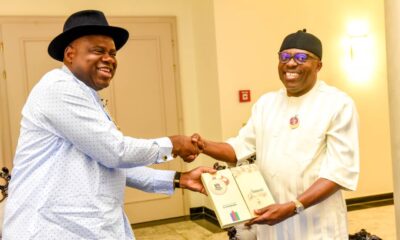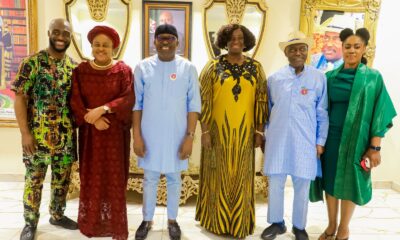Opinion
Future Of Women In Leadership
In almost all spheres of life and for centuries, women have continued to contest against restrictions and selective rights to significantly contribute to the governance of their societies. Even before the start of the 18th century when some people sought to change voting laws to allow women vote in elections, many societies around the world viewed women as a weaker gender.
This was notwithstanding the spectacular strides of some women in shaping their societies even before the First World War. But global events like the world wars challenged and changed the popular notion of women’s physical and mental inferiority and made it more difficult to maintain that women were, both by constitution and temperament, unfit to vote and be voted for. In today’s changing world, gender should no longer be a determinant factor in global leadership and corporate management conversations.
According to Statistics, a total of 58 countries were governed by women between 1960 and 2021. In the last 50 years, 13 countries had more than one female leader. The UN Secretariat’s records show that while women run nearly 21 percent of ministries across the globe, the rate of women in cabinets stands over 50 percent in 14 countries. While figures show a significant improvement of women in the representation of their people parliaments around the world, with Rwanda having the highest rate of female parliament members with 61 percent, followed by Cuba and Bolivia with 53 percent and the United Arab Emirates with 50 percent, the number of women in national parliament in Nigeria has reduced with only 18 females returning to the 10th National Assembly out of the 378 women that contested for a seat in the 2023 general elections.
With women leading almost all major global institutions: Ngozi Okonjo-Iweala as the DG of the World Trade Organisation; Christine Lagarde as the President of the European Central Bank; Kristalina Georgieva as the president of the International Monetary Fund (IMF); Audrey Azoulay as the DG of United Nations Educational, Scientific and Cultural Organisation (UNESCO); Ursula von der Leyen as the president of the European Commission; Winnie Byanyima as the Executive Director of UN AIDS Agency (UNAIDS), among others, it is apt to discuss how to raise and create more opportunities for the next generation of women in leadership.This conversation is important because women leadership is critical to harness the enormous possibilities in building our societies better. Women bring to bear important leadership qualities such as empathy, compassion, courage and character.
Moreover, women are easily able to succeed with managing complex situations because they are authentic, collaborative, rigorous, results-oriented, and sincere. Our societies need all these attributes today to rebuild from multiple social crises. To sustainably nurture the next generation of women in leadership, we must prioritise quality education of the girl-child, ensure girl-child mental wellness, girl-child social securities which include protection against abuse and reduction of restrictions, and proper training of the male-child for civilised cultures. Through mentorship, we can expand future female leaders’ leadership skills and sense of civic responsibility as they consider their own character, leadership, and integrity.
The next generation of women in leadership cannot be built through affirmative action alone, they will be nurtured through education, mentorship, equal opportunities, empowerment and social security. More importantly, our society must begin to look beyond gender considerations and stereotypes. A country with balanced gender opportunities is a country that has conquered cultural conditionings against women. Politically, we must go beyond reserved and restricted positions like women leaders and headship of ministries of women affairs. We need a political reform that makes politics as a friendly as will enable every competent and credible citizen – man or woman to freely and fairly participate in the process. In politics, women must, more than ever, understand that since the Age of Liberty (1718-1772) in Sweden, when conditional women’s suffrage came into effect, to the first province to continuously allow women to vote (Pitcairn Islands) from 1838, to Norway as the first sovereign state to grant women the right to vote, down to as recent as Affirmative Action policies across many democracies, power has never been given to women – the freedom to participate, the freedom of expression and the opportunities to make social impacts are created.
By: Maryam H. Lami
Lami, an online journalist, wrote from Abuja.
Opinion
Nigeria’s Electricity Sector: Need For Restructuring
In mid October, 2024, our national electricity grid suffered three collapses just within a week, throwing many states of Nigeria in total blackouts. Right from independence, Nigeria has always set agendas for attaining steady electricity, but ends up failing to achieve that noble objective. The perennial challenge of providing reliable electricity across Nigeria is however no puzzle beyond humans, yet the sector remains backward, notwithstanding series of reforms and public expenditures. But at the centre of the failures from all past reforms, is a common factor – the reluctance by government, whether deliberate or inadvertent, to extricate itself from the operational lines of the business. The presence of Nigerian government in any business process, especially where it monopolistically occupies vital operational linkage, has proven to create bottlenecks that stifle efficiencies, and defeat the overall objectives.
This was evident in the telecommunications sector, as it is in the petroleum and power sectors. Take for instance, the current policy framework that overshadowes electricity business across Nigeria, where in the name of privatisation, government deliberately butchered off, and separately sold vital organs of the national electricity industry, in an arrangement where the generating companies (GenCos) do not have licences to transmit and distribute generated power, and distribution companies (DisCos) have no licences to produce the sole commodity they sell, while the federal government through the Transmission Company of Nigeria (TCN), monopolistically retains transmission trades between GenCos and DisCos.The insertion of TCN between the private businesses of power generation and distribution, destroys benefits derivable from privatising electricity productions in Nigeria.
With the GenCos and DisCos answerable to the separate managements while the TCN reports to the Federal Ministry of Power, Works and Housing, it is obvious that the unbreakable chain of commands needed for seamless business operations was designed for disarray. Besides, government also solely holds the stakes in gas supplies needed for much of Nigeria’s 16,384 MegaWatts installed capacity. Due to inadequacy of gas supplies, the GenCos produce about 8,415MW, out of which, due to TCN’s inefficiency, only about 4,000MW get to DisCos. However, among the three loosely bound entities in Nigeria’s unholy marriage of electricity production, the GenCos appear more upbeat at investing for increased capacity but are dragged by delivery challenges from the TCN on the one hand, and poor revenue returns from the DisCos, on the other.
The failure of TCN to deploy modern surveillance and field data acquisition technologies to maintain network reliability, has left its facilities prone to vandalism. It does not encourage GenCos who take the major production risks that they can not deal directly with consumers. In the prevailing situation in which DisCos, being closest to power consumers harvest the collective revenue, the opaque nature of that crucial assignment as currently being conducted, gives room for under-reporting.The electricity business like any other, should project transparent prospects of profits to inspire undertakings in investment risks, and it is only operational frameworks that assure investors of end-to-end process integrity that can encourage the deployment of total commitments. Discos’ obvious reluctance at metering, nor upgrading distribution facilities for efficiency, gives no incentives to GenCos to increase investments in power generation.
It does not also help that TCN’s Market Operations (MO) department passes revenue trickles from DisCos, unto GenCos without enforcing collection transparency on the former. Most of Nigeria’s electricity transmission network infrastructure were installed more than 50 years ago. Since inheriting the transmission assets in the 2005 privatisation, and further restructuring in 2013, TCN’s Transmission Service Provider (TSP) department which is responsible for grid construction and maintenance has not done much to expand network capacity in readiness for increased generation. Neither has its System Operations (SO) department, responsible for stabilising operations, upgraded its frequency management and switching capabilities, but still relies on manual switching instead of investing in Supervisory Control and Data Acquisition (SCADA) systems that respond swiftly to changing grid frequencies.
It was not surprising therefore that a usual process fluctuation that came from uploading increased power generation into the national grid had overwhelmed SO’s manual switching capability, leading to the grid collapse of October, although Minster of Power alluded to the fact that the inability of TCN’s aged infrastructure to absorb extra power caused explosions at Jebba sub-station, leading to instabilities that collapsed the grid. Which ever be the case, the buck stops at the TCN, and by extension at government. One may then question the benefits derivable from contracts signed by the Buhari administration with Siemens of Germany in 2019. System automation is undeniably the core expertise of Siemens, and the deployment of the company’s switches would have handled grid fluctuations to prevent any collapse. Despite the huge budget allocations that go into the ministry of power, it is obvious that government processes – encumbered by bureaucracy, politics, paucity of funds and lack of business savvy – is entangling TCN’s abilities at keeping pace with its private partners.
So why should government create such a clog in the wheels of progress? Moreso, it has never been known that government declared financial profits from its years of investments in the power sector, nor are the social benefits apparent. Rather than hold unto an asset that continuously drains scarce finances at no benefits, while creating bottlenecks to processes, government should completely hands-off the industry, focus on its regulatory roles, and draw tax accruals. According to estimates by the World Bank, the failure of reliable power supplies in Nigeria costs yearly losses of $29 billion to companies who had to produce their own power, and is a major reason most companies close down in the country, or have migrated elsewhere, despite our human resource potentials and Nigeria being a huge market. The current Nigeria Electricity Supply Industry (NESI) structure, in which government-owned TCN is sandwiched between disunited GenCos and DisCos, is causing conflict of interests, unsustainable and ensures a tie of stagnation.
The electricity production framework should be restructured, even if it means partitioning the national grid, into a form that gives power companies combined and seamless abilities to generate, transmit and distribute power directly to their consumers, as being experimented by the Geometric Group in Aba.
Joseph Nwankwor
Opinion
“Ye Are Gods”: A Contemporary Review
The phrase “Ye are gods”,as contained in Psalm (82:6) and reiterated by Jesus in John (10:34), has been a major source of controversy in humanity. Taken alongside the biblical assertion “God created man in his own image and likeness” (Genesis 1:26) it sums up to Rev STK Appah’s posit that “what is in the original is in the creation”. Over the years, divergent views have been adduced on this contentious issue, which violently tugs at the roots of our belief system. Come, share my thoughts. In a one-man live-in protest over a discriminatory housing policy at Murray State University, Murray, Kentucky, USA, I occupied the six-floor Hart Hall (men’s hostel) during Thanksgiving Holiday of 1974. At the end of that effort, I wrote a poem titled “Why can’t we live together” and an article and submitted both to Murray State News, the university newspaper. The article, which vociferously decried the policy, was published with the title “Student Speaks Out” on December 6, 1974, but the poem was not. The essence of the poem said: “Some Beings are watching us to see how we get on/Let’s pull forces together and live in oneness”.
My take on the rejection of the poem was the fact that, irrespective of President Eisenhower’s triple liaison with aliens in New Mexico in 1954 and the strange crash on July 7, 1947 at Roswell, New Mexico, Americans were living in denial of an advanced civilization in the cosmos. Sadly, humanity still lives in that denial. In 2006, I wrote “In His Image and Likeness: Pondering Over Creation and the Divine Essence”. Drawing from the scriptures, I contended that “man is of equi-potentiality with his Creator who is not the multi-Omni Spirit Being…[and that] in the endlessness of eternity, man will also create in his image and likeness”. At the heels of the article, which was published by MELINTAS—Journal of Philosophy and Religion at Parahyangan Catholic University of Indonesia, I received fifty-eight hate mails and twenty-nine support mails. The hate mails pronounced the equivalent of fatwa on me; one of the support mails commended my “liberated mind”.
Today, Geoffrey Hinton, the acclaimed Godfather of artificial intelligence (AI), has quit his job at Google and has warned humanity of the dangers of AI. Asked if humanity knows what it is doing with AI, Hinton offered a definitive “No” and added that “We may have created something more intelligent than us”. Hinton furthers that AI can understand, has intelligence and experience and can make decisions on its own based on those experiences “in the same sense as humans do.”. The scary part is that Hinton thinks that, in time, AI will become conscious of its existence, rewire its circuits and become more intelligent than man; then, humans will become the second most intelligent beings on earth. Meanwhile, Elon Musk says that his “Citigirl”, an AI with the capacity of incubating and delivering a baby, will hit the marketplace in 2026. These are godly feats.
The above is reminiscent of the allegory of Tower of Babel. The Creator in the Babelian episode was surprised and sufficiently threatened by man’s exploits hence the infliction of the scourge of linguistic plurality on the human brain. Notedly, this fear-induced act of self preservation by the Creator, introduced conflict amongst the hitherto monolingual Babelian workforce that worked harmoniously towards building “a city, with a tower that reaches to the heavens” (Gen 11:4). The truth remains that, in the universal context, we are dealing with a hierarchy of Gods and there are millions of inhabited planets in the Cosmos; Jesus alluded to this thus: “In my father’s house there are many mansions” (John 14:2). Planet earth is just a tiny little speck of sand on the sprawling beach of creation. The fear of the capacity of AI and the regret expressed by Geoffrey Hinton are reminiscent of the Creator’s expressed regrets for creating man (Genesis 6:6) and palpable fears at Babel (Genesis 11:1-9).
It is also a reminder of Dr. Frankenstein’s experience with the monster he created. So, it is asked: Is humanity at the verge of an encore of the Babelian exploit? If so, is the Creator likely to intervene? AGAIN?! Man is certainly at the threshold of a profound experience. All said, man has reached a major milestone in his quest to “dominate his environment”. However, he has toed the path of perdition. Here, Thomas Paine’s philosophy of “doing good” as a religion and “the world” as his country is the required mindset for humanity. Taken alongside the Humanist school of thought and the objectives of Universal State of Earth (USE), perhaps man will find global harmony and depart from his self-destruct trajectory. The Creator of man is not the multi-Omni Being . Man’s Creator is the plurality that created in their image and likeness at Eden; they may be the same ones that were surprised and scared at Babel and the Lords of Ezekiel’s encounters.
The larger picture is that we are gods and can also create in our image and likeness. Man is much more than he realises. Given the elasticity and rewireability of the brain, man is yet to achieve the godly potential of his God-given brain. So, “Let’s get forces together and live in oneness” by putting our lights on and training our children to leave their lights on. That way, we would transcend matter, heal the world and take our proper place in the universal hierarchy of gods.
Jason Osai
Osai wrote in from Port Harcourt.
Opinion
Child Rape: A Global Menace

Child rape is a profound human right violation that inflicts lasting physical, emotional, and psychological scars on its victims. Among the most vulnerable groups, the girl-child faces a disproportionate amount of sexual abuse globally, reflecting deep-rooted societal, cultural, and systemic failures. Despite international laws and local measures aimed at protecting children, rape and sexual violence against girl-child remain a pervasive problem in many parts of the world, as it is alarmingly prevalent worldwide. According to data from the World Health Organisation (WHO), one in four girls experiences some form of sexual abuse before the age of 18. This abuse occurs across all socio-economic, cultural, and geographical divides. The underreporting of sexual violence against children, fueled by fear, stigma, and victim-blaming, makes it difficult to grasp the true scale of the problem.
Reports from organisations like UNICEF and Human Rights Watch highlight that in some regions, girl-children are specifically targeted due to the belief that they are “pure” or “virgin,” making them more vulnerable to cultural myths that suggest intercourse with a virgin can cure diseases like HIV/AIDS. These deeply harmful beliefs exacerbate the risk for young girls, particularly in countries where educational and legal protections are weak.A range of factors contributes to the high incidence of rape against girl-children, many of which are embedded in patriarchal and misogynistic beliefs. In some cultures, girls are viewed as inferior or subservient to males, making them easy targets for exploitation. The normalisation of gender-based violence in some communities means that abuse often goes unnoticed, unreported, or unpunished. Child marriage, which remains prevalent in some parts of Africa, Asia, and the Middle East, is another contributing factor.
When girls are married off as children, they are often exposed to sexual violence under the guise of marital relations. These young brides, who are typically powerless in these situations, often endure repeated sexual abuse from their significantly older husbands.Additionally, in conflict zones, girl-children are disproportionately affected by sexual violence, used as tools of war by armed groups to terrorise communities. Such exploitation results in severe trauma and long-lasting consequences for victims. Rape and sexual abuse leave devastating effects on a girl-child, both physically and mentally. Physically, young girls are not developed enough to handle sexual intercourse, leading to severe injuries, infections, and even death in extreme cases. Many victims also face long-term reproductive health issues, including infertility, sexually transmitted infections (STIs), and complications in future pregnancies.
The psychological toll is equally profound. Victims often suffer from depression, anxiety, post-traumatic stress disorder (PTSD), and other mental health conditions. The stigma associated with sexual violence further isolates them from their families and communities, leaving them vulnerable to further exploitation or abuse. The educational consequences are also significant. Many victims drop out of school due to the trauma, fear of facing their abusers, or the stigma attached to rape. This creates a cycle of poverty and dependence, further reducing their life chances. Access to justice for child rape victims is often fraught with challenges. In many countries, laws around sexual violence are outdated, under-enforced, or not well understood. Law enforcement agencies frequently lack the training or resources to handle cases of child sexual abuse appropriately, leading to further victimisation during investigations.
In some cases, cultural practices such as “settling” rape cases between families, or forcing victims to marry their rapists, prevent victims from receiving the justice they deserve. This, not only robs the victim of justice but perpetuates a culture of impunity where perpetrators feel empowered to commit further acts of violence. Additionally, the social stigma surrounding rape prevents many girl-children from coming forward. Fear of blame, retaliation, or being ostracised by their communities often keeps victims silent, allowing abusers to continue their crimes unchecked. Internationally, the United Nations Convention on the Rights of the Child (UNCRC) and the Sustainable Development Goals (SDGs) both call for an end to all forms of violence against children, including sexual abuse. Organisations such as UNICEF, Plan International, and Save the Children, have been instrumental in raising awareness, supporting survivors, and lobbying for stronger laws and protections.
On a national level, many countries have taken steps to strengthen legal frameworks to protect children from sexual violence. Child protection laws, survivor-centred legal reforms, and harsher penalties for offenders have been introduced in several countries. However, effective implementation remains a challenge in many places due to corruption, weak legal systems, and deep-seated cultural barriers. To truly address the epidemic of child rape, a multi-faceted approach is needed that tackles the root causes of the problem. Education and Empowerment of girl-children can go a long way in preventing rape cases in the society. Educating girls about their rights, providing them with life skills, and empowering them to speak out against violence are crucial steps in preventing abuse. Equally important is educating boys and men about consent, respect, and gender equality to shift harmful patriarchal norms.
Girls and women need stronger legal protection to escape some of the rape cases that occur regularly. Governments must prioritise the implementation of robust child protection laws, ensuring that law enforcement agents are well-trained and sensitised to handle cases of child rape. Special courts for handling cases involving children, victim support services, and protective measures should be readily available to survivors. If we have to curb child rape menace, community engagement must be included in the process. Engaging communities to change attitudes toward girl-children and dismantling harmful gender norms is essential. Community leaders, religious figures, and educators can play a pivotal role in shifting mindsets and promoting zero tolerance for violence against children.
Furthermore, there is the need for support for survivours of rape. Comprehensive support systems for survivors are critical for the rest of their lives. These include access to psychological counselling, medical care, legal aid, and safe spaces where victims can heal and rebuild their lives. Schools should also provide supportive environments to help victims continue their education without fear of stigma or discrimination. Global Advocacy and Accountability from World Health Organisation (WHO), UNICEF, and other relevant agencies should as a matter of fact continue to create more awareness and sensitisation on the need to save the girl-child. International organisations and governments must continue to advocate for the protection of children’s rights, ensuring that perpetrators are held accountable. Monitoring mechanisms, transparency in legal proceedings, and collaboration between countries are key to fighting transnational issues like child trafficking for sexual exploitation.
It is worrisome to note in the 21st century, as the world is a global village, fully digitalised, when the girl-children should be allowed to showcase their potentials, instead they are trafficked to do jobs that will harm their lives. Parents particularly, should have the number of children they can cater for. They should also pay attention to the ones they have. Moreso, the boy-children and the men should be sensitised on the need to stop the menace. Rape and sexual violence against girl-children are some of the gravest injustices of our time, robbing millions of their childhoods and futures. While progress has been made, there is still much work to be done to protect the most vulnerable among us. It is only through collective action, from governments, communities, families, and international organisations, that we can create a world where girl- children are safe, empowered, and free from violence.
By: Perpetual Izuegbunam
-

 News13 hours ago
News13 hours agoWE’LL IMPACT LIVES OF RIVERS PEOPLE EQUALLY, FUBARA ASSURES
-

 News13 hours ago
News13 hours agoWE NEED TO WORK TOGETHER IN S’SOUTH TO ACHIEVE REGIONAL DEV, FUBARA INSISTS
-

 News13 hours ago
News13 hours agoTinubu Rejoices As Warri Refinery Begins Operations
-

 News13 hours ago
News13 hours agoTinubu Mourns Ex-US President, Jimmy Carter
-

 News13 hours ago
News13 hours agoNigeria Has No Reason To Be Poor – Ooni
-

 News13 hours ago
News13 hours agoIN RIVERS, GOD REMAINS OUR ULTIMATE LIBERATOR – FUBARA
-

 News13 hours ago
News13 hours agoCHRISTMAS: FUBARA, WIFE HOST RIVERS CHILDREN, TASK THEM ON EXEMPLARY CONDUCT
-

 Nation3 days ago
Nation3 days agoBodo-Bonny Road: Julius Berger Workforce Maintains Steady Work to ensure timely delivery

